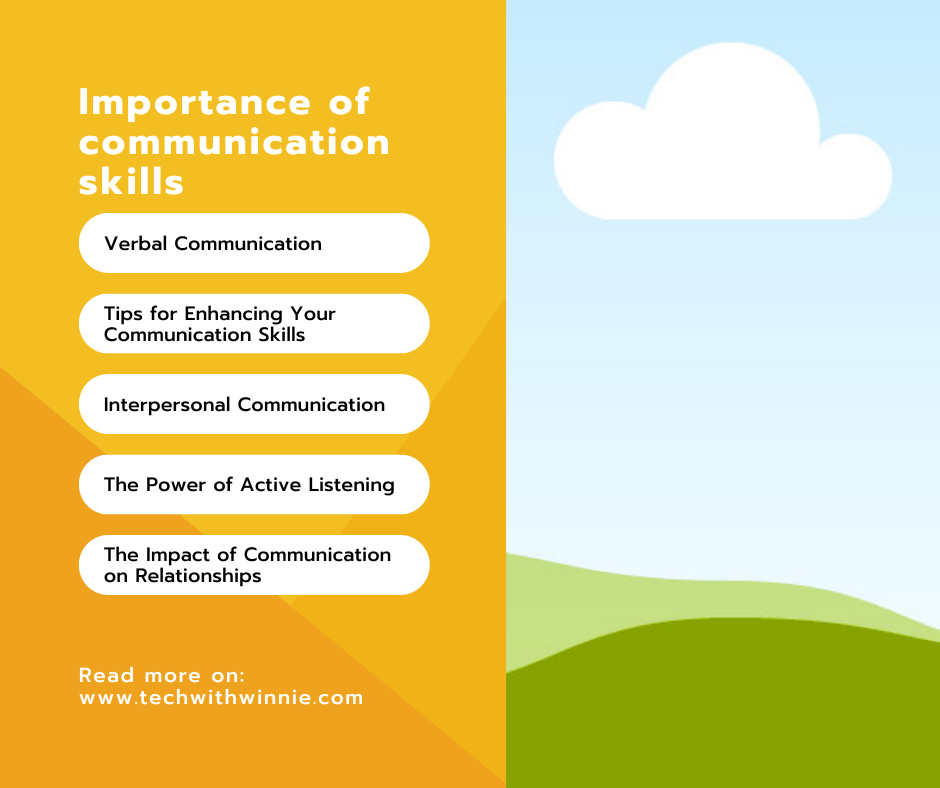Importance Of Communication Skills: Why they matter more!
In a world increasingly dependent on technology and digital interactions, the importance of communication skills never ceases. From forging meaningful relationships to succeeding in your career, the ability to communicate effectively unlocks countless opportunities and enriches our lives in profound ways.
While often overlooked, communication skills are the cornerstone of personal and professional success. They allow us to build bridges, share ideas, collaborate effectively, and navigate the complexities of human interaction. Whether you’re an entrepreneur pitching your next big idea or a parent having a difficult conversation with your child, strong communication skills equip you with the tools to navigate life’s challenges and triumphs.
This blog dives deep into the multifaceted world of communication, exploring its significance in various aspects of our lives. We’ll delve into importance of communication in our life, the different facets of communication, address common pitfalls, and offer practical tips to enhance your communication skills for greater personal and professional fulfilment.
Different Types of Communication
Communication is not a one-size-fits-all concept. It encompasses a diverse range of styles and methods, each suited to specific situations and objectives. Here are some key types of communication:
- Verbal Communication: The art of spoken language, using words and vocal cues to convey thoughts and feelings. Mastering verbal communication includes clear articulation, active listening, and tailoring your message to your audience.
- Non-Verbal Communication: The often-overlooked language of body language, facial expressions, and gestures. Non-verbal cues can reinforce your message or contradict it, highlighting the importance of mindful communication.
- Communication in writing: Effectively translate your ideas into compelling written pieces, tailoring your language and style to resonate with different audiences across emails, reports, social media, and other forms. Clear structure, grammar, and concise language are essential for impactful written communication.
- Interpersonal Communication: The art of connecting with individuals on a personal level, fostering trust, and understanding diverse perspectives. Active listening, empathy, and emotional intelligence are crucial for effective interpersonal communication.
- Public Communication: Effectively delivering information and engaging with audiences in larger settings, such as presentations or speeches. Confidence, clarity, and audience engagement are key elements of successful public communication.

Importance of Communication skills
The Power of Active Listening
Communication is a two-way street. While expressing yourself clearly is important, actively listening is equally crucial. This involves giving your full attention to the speaker, understanding their message beyond just the words, and demonstrating your engagement through verbal and non-verbal cues. Good listening fosters trust, builds rapport, and allows you to respond thoughtfully and meaningfully.
The Impact of Communication on Relationships
Communication is the lifeline of any relationship, be it with your family, friends, colleagues, or romantic partner. Strong communication promotes intimacy, understanding, and conflict resolution. It allows you to express your needs and desires effectively, empathize with others’ perspectives, and work collaboratively towards shared goals. Ineffective communication can act as a barrier, causing misinterpretations, building up frustrations, and ultimately damaging the very connections we value most.
Career Catalyst: How Communication Skills Propel Your Professional Journey
Whether you’re seeking a new job, negotiating a promotion, or leading a team, strong communication skills are invaluable assets in your professional life. They enable you to articulate your ideas persuasively, collaborate effectively with colleagues, and build trust with clients and stakeholders. In today’s competitive job market, communication skills often differentiate successful candidates from the rest.
Conveying Your Ideas with Impact
Communicating effectively isn’t just about being heard; it’s about influencing others and inspiring action. The ability to craft persuasive arguments, tailor your message to your audience, and use storytelling techniques can help you gain buy-in for your ideas, win over clients, and motivate others to follow your lead.
Communication as a Tool for Resolution
Disagreements and conflicting viewpoints are inevitable in life. However, how you communicate during these situations determines the outcome. By approaching conflict with an open mind, actively listening to understand the other person’s perspective, and expressing your own concerns calmly and assertively, you can navigate conflict constructively and reach mutually agreeable solutions.

Effective Communication Across Cultures
In an increasingly interconnected world, understanding and appreciating cultural differences is essential for effective communication. This involves being mindful of the nuances of language, respecting diverse viewpoints, and adapting your communication style to different cultural contexts.
Communication for Everyone
Communication extends beyond traditional spoken and written words. Individuals with disabilities utilize diverse communication methods, including sign language, assistive technology, and alternative communication strategies. Recognizing and respecting these unique communication styles fosters inclusivity and ensures everyone has a voice.
Tips for Enhancing Your Communication Skills
Here are some practical tips to help you elevate your communication skills in various aspects:
Verbal Communication:
- Practice active listening: Pay close attention, maintain eye contact, ask clarifying questions, and avoid interrupting.
- Articulate clearly: Speak clearly and concisely, using appropriate vocabulary and avoiding jargon.
- Modulate your voice: Vary your tone and volume to keep your audience engaged.
- Be mindful of non-verbal cues: Maintain open body language, use appropriate gestures, and project confidence.

Written Communication:
- Proofread: Meticulously proofread your writing to eliminate typos, grammatical errors, and punctuation missteps, ensuring your message shines through with clarity and professionalism.
- Structure your message effectively: Use clear headings, paragraphs, and bullet points for easy reading.
- Tailor your language to your audience: Consider their level of understanding and adapt accordingly.
- Use concise and impactful language: Avoid redundancy and ensure your message is clear and to the point.
Interpersonal Communication:
- Practice empathy: Try to understand others’ perspectives and feelings.
- Respond with respect: Even when disagreeing, be mindful of your tone and avoid personal attacks.
- Communicate openly and honestly: Share your thoughts and feelings authentically while remaining respectful.
- Give and receive feedback constructively: Focus on behaviour and offer specific suggestions for improvement.
Public Communication:
- Know your audience: Tailor your message to resonate with their interests and needs.
- Practice your delivery: Rehearse beforehand to overcome nervousness and ensure smooth delivery.
- Use engaging visuals: Slides, pictures, and videos can enhance your message and keep your audience engaged.
- Be confident and enthusiastic: Your passion and conviction will captivate your audience.
Remember: Communication is a lifelong journey. Embrace continuous learning, seek feedback, and practice diverse communication styles to hone your skills and unlock your full potential.
Conclusion: The Unwavering Value of Communication
Communication is not simply a tool; it’s the very fabric of our social interactions, professional success, and personal fulfillment. It allows us to connect with others on a deeper level, share our thoughts and ideas, and build meaningful relationships. By mastering the art of communication, we gain the power to navigate life’s challenges, forge lasting connections, and create a more positive and understanding world.
So, embark on your communication journey today. Embrace the power of active listening, craft your message with care, and nurture your understanding of diverse communication styles. As you hone your skills, you’ll witness the transformative power of communication, unlocking a world of possibilities and enriching your life in countless ways.
Also read related article on Hard and Soft skills.




1 comment